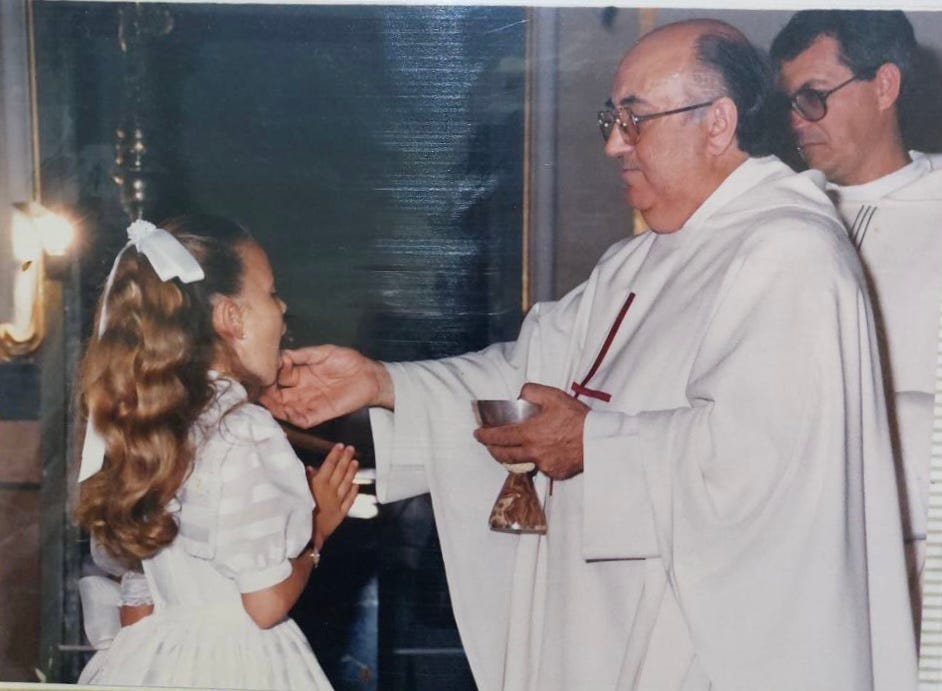Dwelling in Time
How Ceremonies Anchor Our Existence
P had his first communion last Thursday. It may seem like a strange day for a first communion, which usually takes place on Sundays, but in Sweden this Thursday was Ascension Day, and, strange as it may seem, in the most secular country in the world, it is a national holiday.
This is not a letter about religion, but it is about rituals.
It's about how I took P to church half an hour early to help him get dressed, and on the way there, he asked me if I remembered my first communion. I told him yes: that I didn't feel anything grand, but that I was a little emotional. I also told him that the wafer stuck to the roof of my mouth, and I didn't know how to get it off. It's about how P laughed at my story as we walked with the sun on our faces.
It's about how I helped P put on the white robe over his clothes and adjust the collar, which had a crown embroidered on it with the letters IHS in the center, in the church kitchen.
It's about how the catechist explained to all the children that IHS means Iesus Hominum Salvator, and how, remembering what those words mean, my heart stirred for the first time that day.
It's about how the children waited in line in the vestibule, and how the congregation saw the three priests, the altar boys, the deacon, and the catechists pass through the church to gather the children and lead them into the church, where their community was waiting for them.
It's about how my heart stirred for the second time when I saw the children enter the church, with everyone standing up to greet them, showing them that they were welcome in the house of the Lord.
It's about how the church was full of parents and children of all ages, and how the prayers mingled with the cries and laughter of the youngest children, and how their presence made the Mass even more solemn, if that were possible. Because this is about joy.
It's about how the Mass was simple and to the point, and how the priest didn't give a long-winded sermon, but kept the children's attention by talking to them about how God is great but fits in our hearts, just as a landscape is immense but fits in our eyes.
It's about how my heart stirred for the third time when I saw P take communion for the first time.
It's about how, after Mass, the five of us went to his favorite restaurant, and he finally dared to order something other than the Pad Thai he usually orders, venturing to try pulled chicken and flat rice noodles covered in a sweet and sour sauce, slightly spicy and with garlic oil. It's about how he told us, ‘From now on, this is my favorite dish’. And C and I laughed, because he's been ordering the same thing at the restaurant for five years.
It's about how, after lunch, we all went home to watch a movie and take a nap.
I discovered Citadel, the posthumous work of Antoine de Saint-Exupéry, when I was 20, hidden in the tiny fiction section of my medical school library. Not many people ventured into that area, so out of place among anatomy atlases, physiology treatises, and pathology compendiums. I say “section” when, in reality, it was just a bookshelf, but it was my refuge during the six years I was studying for my degree.
Getting back to the book: between you and me, I don't remember the content very well, but I do remember its form. I was struck by the beauty of the words. I was struck by how Saint-Exupéry didn't seem to have written them; rather, they seemed to me like words dictated to him by a divinity, and he simply transcribed them, half in a trance. That's why it seems like a scattered text, with no fixed theme, no beginning and no end. But if you pay attention, it speaks to you, above all, about how men are bound to the earth and the heaven, and nothing can undo that bond.
But I do remember one passage very well, because it explained clearly to me this condemnation of human beings to live in time, and how we cope with it through rituals that bring us closer to our other nature: the infinite.
And rituals are to time what dwellings are to space.
For it is good that the passing of time does not feel as if we are wearing ourselves out
and losing ourselves, like a handful of sand, but of fulfilling ourselves.
I remembered this passage when I saw the priests pass in front of us to gather the children and then lead them into the church. It seemed to me that, at last, I understood the reason for certain traditions: the importance of expressing what we feel inside through external acts. It was like saying to the little ones, ‘Come in, this is your home, and your loved ones are waiting for you.’
Ceremonies lift us up, remind us that we are just passing through, and anchor us not to the earth, but to the meaning that sustains us.




You gather your thoughts well, Ana. Thank you. I believe you leave your readers with the same feeling Saint-Exupéry does.
Ana!!!! What a present!!! Thank you thank you thank you!!!